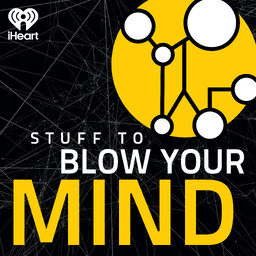From the Vault: Inner Cosmos, with David Eagleman
In this classic episode of Stuff to Blow Your Mind, neuroscientist and author David Eagleman drops by the show to discuss his new podcast series “Inner Cosmos” with Robert and Joe, along with some general discussion on the human brain. (Originally published 04/13/2023)
In 1 playlist(s)
Stuff To Blow Your Mind
Deep in the back of your mind, you’ve always had the feeling that there’s something strange about re…Social links
Follow podcast
Recent clips

Crab Bag, Part 4: For Whom the Crab Tolls
59:12

The Artifact: The Walking Stick Fiddle
05:13

Crab Bag, Part 3: The Crab is a Lonely Hunter
55:55
 Stuff To Blow Your Mind
Stuff To Blow Your Mind